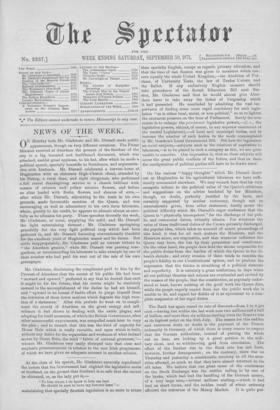of Scotland, on the ground that Scotland is so safe
that she cannot be alienated, or, as the lady put it,—
" To him whom I do know to love me best
Ho should be sure to have my favours least "— maintaining that specially Scottish legislation is no more in arrear
than specially English, except as regards primary education, and that the time of last Session was given to measures which con- cern equally the whole United Kingdom,—the Abolition of Pur- chase, of University Tests, the law of Trades' Unions, and the Ballot. If any exclusively English measure should take precedence of the Scotch Education Bill next Ses- sion, Mr. Gladstone said that he would almost give Aber- deen leave to take away the ticket of burgesship which it had presented. He concluded by admitting the vast im- portance of finding some more rapid machinery for such legis- lation " as is either local, social, or non-political," so as to lighten the enormous pressure on the time of Parliament. Surely the true course is to enlarge the provisional legislative powers,—(i. c., the legislative powers, subject, of course, to any superior enactment of the central Legislature),—of local and municipal bodies, and to increase the number of such bodies in the mode contemplated in Mr. Goschen's Local Government Bill. But how the legislation on social subjects,—subjects such as the relations of capitalists to labourers,—is to be placed in such a category as this, we are quite unable to conceive. Our impression is, that on these subjects will occur the great public conflicts of the future, and that on them the configuration of political parties will have to be drawn anew.






























